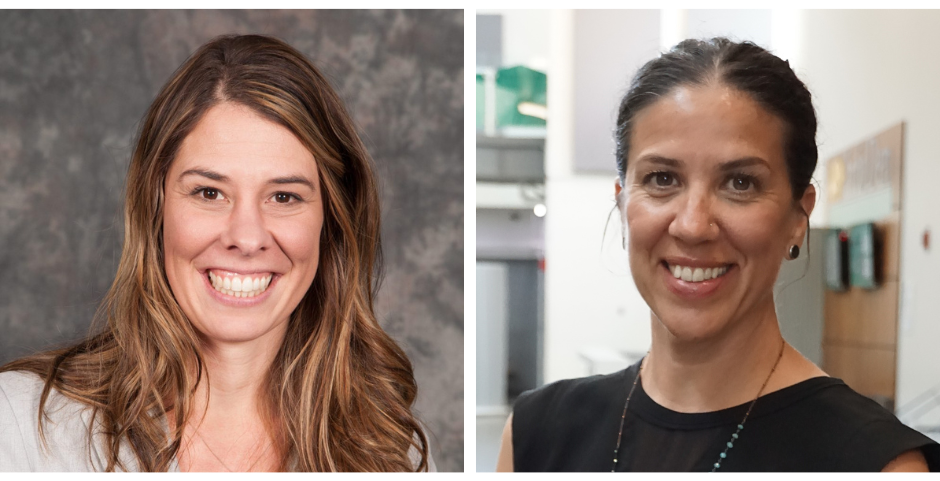Building relationships and understanding through sport and recreation
Danica Erickson - 15 June 2023

Tara-Leigh McHugh (l) and Jill Cameron (r)
When we think about how Indigenous people in Canada might reclaim their culture, sport and recreation may not be the first areas that come to mind. “Especially being in a Faculty of Kinesiology, Sport and Recreation (KSR), there's a kind of unspoken belief that sport is great and sport benefits everyone,” says KSR professor Tara-Leigh McHugh. “That hasn't always been the case. And it's still not always the case in many communities.” McHugh, an instructor in the Indigenous Sport and Recreation (ISR) Graduate Certificate program, is hoping this certificate will address that.
McHugh joined the University of Alberta in 2009, filling a position that focused specifically on Indigenous health in sport. Although not Indigenous herself, her background, knowledge and research interest in working with Indigenous communities led her to get involved in the development of the certificate. “There aren’t too many people with research experience who have worked alongside Indigenous youth and Indigenous communities around sport and recreation. There’s a gap across the country; we've had some amazing Indigenous scholars on faculty and so we're fortunate at the U of A to be leaders in this area of research,” she explains.
Individuals with an undergraduate degree and at least two years of work experience are eligible to take the IRS certificate program, the content of which draws heavily on Indigenous-led research that's focused on sport and recreation broadly. Each of the three courses offers a specific focus, with the first course setting the stage with information about the historical and contemporary relationships between Indigenous communities and settler communities.
The second focuses on sport and physical activity with Indigenous communities, including the complex historical relationship between Indigenous Peoples and sport and recreation. “I think that historical piece is really something that students are drawn to, because Indigenous and non-Indigenous students may have contemporary understandings, but understanding how sport and physical activity have historically been involved in Indigenous communities is really important,” McHugh points out.
The third and final course focuses on recreation management in Indigenous communities, providing students with the opportunity to implement what they’ve learned in the first two classes, while working alongside Indigenous communities in sport and recreation programming. McHugh and her colleague Jill Cameron believe this chance to apply what they’ve learned in the real world is the greatest strength of this course.
“I often get emails back from students after they've completed the certificate, telling me what they’ve been able to do because of what they learned. We’re seeing our students being able to do something with the content that they're receiving, and it's really important to recognize that kind of applicable knowledge,” says Cameron, who is the manager of international and community education in the Faculty of KSR.
McHugh agrees, adding, “Maybe it's an infographic or a presentation that was done in class, then they used it in their respective workplaces. I think that’s really great; it shows the content and activities are applicable in the workplace.”
Cameron is heartened by the genuine enthusiasm students show for the courses. She’s found they’re all legitimately interested in the subject matter, not just trying to meet an employment requirement or secure employment. “So many times I’ve heard ‘This is exactly what I'm looking for. This content is so interesting to me, I really want to learn more in this area’. Students really are craving and wanting this content,” she says.
McHugh is especially excited when taking the certificate inspires students to pursue a master’s degree. “Every year, I get at least one or two students interested in pursuing graduate studies reaching out to me or one of the other instructors, likely because of some of the experiences they've had. The certificate gives them a sense of the research opportunities and options available to them,” she shares.
Even though the course is asynchronous and students come from varied professional backgrounds all across Canada, course participants build connections and networks that extend after they complete the certificate.
“We've had students from right here in Alberta, all the way across to the East Coast and to the North. They’re building networks and communities of practice with like-minded professionals. I think that’s been really valuable to many of the cohorts,” says McHugh. Cameron even had four or five graduates from different organizations and different regions of the country contact her about the potential for them to apply for a grant as a group.
The certificate has been well received from the beginning, with 18 people registered in the first cohort, and a consistent five to 10 people for subsequent offerings.
Students may represent varying regions and professions, but what they have in common is a desire to learn how to work alongside and in partnership with Indigenous communities and communities in general. Both Cameron and McHugh agree that this course is useful for allied health professionals, rehabilitation practitioners, physicians, physiotherapists, teachers, law enforcement personnel – anyone, really.
“We're in Canada. You've probably worked alongside, are working, or will work alongside an Indigenous community at some point,” says McHugh.
The application deadline for the Indigenous Sport and Recreation graduate certificate is August 1, 2023. Learn more and apply here.